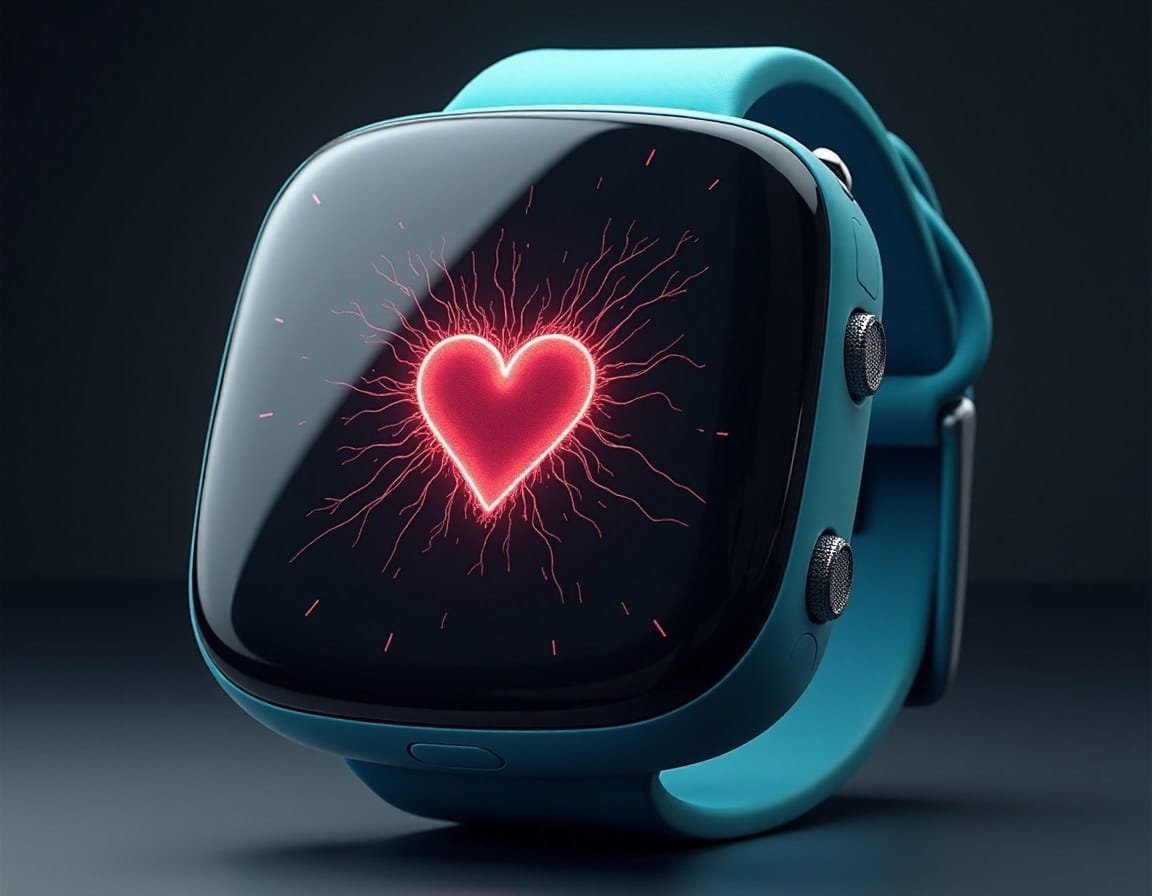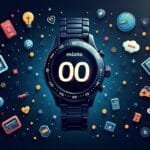The Future of Heart Rate and Stress Monitoring Wearables: Top 10 Devices Revolutionizing Your Health in 2025

Are You Wearing Your Stress on Your Sleeve? Discover the Revolutionary Stress Monitoring Wearables That Can Predict Heart Attacks and Change the Future of Healthcare Forever.
In today’s fast-paced world, stress has become an inevitable companion for many fitness enthusiasts and individuals alike. With the rise of wearable gadgets and technology trends, it’s no surprise that stress monitoring wearables have taken center stage in the health and wellness industry. These innovative devices not only track your heart rate but also monitor stress levels, providing valuable insights into your mental well-being.
As we continue to push the boundaries of wearable technology, stress monitoring wearables are poised to revolutionize the way we approach healthcare. By leveraging cutting-edge sensors and AI-powered algorithms, these wearables can detect early warning signs of cardiovascular disease, allowing for timely interventions and potentially saving lives. In this article, we’ll delve into the top devices for US & global fitness enthusiasts, exploring their features, benefits, and real-life applications. Whether you’re a seasoned athlete or simply looking to take control of your mental health, our comprehensive guide will help you navigate the world of stress monitoring wearables and discover the perfect device to suit your needs.
What is Stress Monitoring Wearables?
Stress monitoring wearables are advanced devices designed to track and analyze physiological indicators of stress, such as heart rate variability, skin conductance, and cortisol levels, providing real-time insights into an individual’s stress levels and overall mental well-being.
The Evolution of Wearable Gadgets and Technology Trends
The journey of wearable technology has been nothing short of remarkable. From the early days of basic fitness trackers to the sophisticated stress monitoring wearables we see today, the evolution has been driven by a relentless pursuit of innovation. The integration of advanced sensors, AI algorithms, and seamless connectivity has transformed these devices into powerful tools for health management.
In the early 2000s, wearables were primarily focused on tracking physical activity, such as steps taken and calories burned. However, as technology advanced, so did the capabilities of these devices. The introduction of heart rate monitors marked a significant milestone, allowing users to gain deeper insights into their cardiovascular health. Fast forward to 2025, and we now have wearables that can monitor not only heart rate but also stress levels, sleep patterns, and even detect early signs of chronic diseases.
One of the key drivers behind this evolution is the increasing awareness of mental health and its impact on overall well-being. As a result, manufacturers have shifted their focus towards developing stress monitoring wearables that can provide users with actionable insights to manage their stress levels effectively. This shift has been further fueled by advancements in sensor technology, machine learning, and data analytics, enabling wearables to deliver more accurate and personalized health data.

Top 10 Stress Monitoring Wearables Revolutionizing Your Health in 2025
As we look ahead to 2025, several stress monitoring wearables are set to make a significant impact on the health and wellness industry. These devices are equipped with state-of-the-art features that not only monitor stress levels but also provide actionable insights to help users manage their mental well-being. Here are the top 10 devices that are revolutionizing health monitoring:
1. Apple Watch Series 9
The Apple Watch Series 9 continues to lead the market with its comprehensive health monitoring features. Equipped with advanced heart rate sensors and an electrocardiogram (ECG) app, it can detect irregular heart rhythms and provide early warnings of potential cardiovascular issues. The addition of a stress monitoring feature, which uses heart rate variability (HRV) data, makes it a powerful tool for managing mental health.
2. Fitbit Sense 2
The Fitbit Sense 2 is designed to be a holistic health companion. It features an electrodermal activity (EDA) sensor that measures skin conductance to detect stress levels. Combined with heart rate monitoring and sleep tracking, the Fitbit Sense 2 provides a comprehensive view of your overall well-being. Its guided breathing exercises and mindfulness sessions help users manage stress effectively.
3. Garmin Venu 3
Garmin’s Venu 3 is a versatile smartwatch that excels in both fitness and health monitoring. Its advanced heart rate sensor and stress tracking capabilities make it an ideal choice for athletes and fitness enthusiasts. The Venu 3 uses HRV data to provide real-time stress insights and offers personalized recommendations to help users manage their stress levels.
4. Samsung Galaxy Watch 6
The Samsung Galaxy Watch 6 is a feature-packed smartwatch that offers robust health monitoring capabilities. Its stress monitoring feature uses HRV data to provide real-time stress insights. The watch also includes guided breathing exercises and meditation sessions to help users manage stress effectively. Additionally, the Galaxy Watch 6 offers comprehensive sleep tracking and heart rate monitoring.
5. Whoop Strap 4.0
The Whoop Strap 4.0 is a popular choice among athletes and fitness enthusiasts for its advanced health monitoring features. It tracks HRV, sleep, and recovery metrics to provide a comprehensive view of your overall well-being. The Whoop Strap 4.0’s stress monitoring feature uses HRV data to provide real-time stress insights and personalized recommendations for managing stress.
6. Oura Ring 3
The Oura Ring 3 is a sleek and discreet wearable that offers advanced health monitoring features. It tracks HRV, sleep, and activity levels to provide a comprehensive view of your overall well-being. The Oura Ring 3’s stress monitoring feature uses HRV data to provide real-time stress insights and personalized recommendations for managing stress. Its compact design makes it an ideal choice for those who prefer a minimalist approach to wearable technology.
7. Amazfit GTR 4
The Amazfit GTR 4 is a budget-friendly smartwatch that offers robust health monitoring features. Its stress monitoring feature uses HRV data to provide real-time stress insights. The watch also includes guided breathing exercises and meditation sessions to help users manage stress effectively. Additionally, the Amazfit GTR 4 offers comprehensive sleep tracking and heart rate monitoring.
8. Polar Vantage V3
The Polar Vantage V3 is a high-performance smartwatch designed for athletes and fitness enthusiasts. Its advanced heart rate sensor and stress tracking capabilities make it an ideal choice for those looking to optimize their training and recovery. The Vantage V3 uses HRV data to provide real-time stress insights and offers personalized recommendations to help users manage their stress levels.
9. Suunto 9 Peak
The Suunto 9 Peak is a rugged smartwatch designed for outdoor enthusiasts. Its advanced heart rate sensor and stress tracking capabilities make it an ideal choice for those who enjoy outdoor activities. The Suunto 9 Peak uses HRV data to provide real-time stress insights and offers personalized recommendations to help users manage their stress levels. Its durable design makes it suitable for extreme conditions.
10. Withings ScanWatch
The Withings ScanWatch is a hybrid smartwatch that combines classic design with advanced health monitoring features. Its stress monitoring feature uses HRV data to provide real-time stress insights. The watch also includes guided breathing exercises and meditation sessions to help users manage stress effectively. Additionally, the ScanWatch offers comprehensive sleep tracking and heart rate monitoring.
How Stress Monitoring Wearables Work
Understanding how stress monitoring wearables work can help you make the most of these devices. These wearables use a combination of sensors and algorithms to track physiological indicators of stress. Here are some of the key components and how they function:
- Heart Rate Variability (HRV): HRV is a measure of the variation in time between consecutive heartbeats. It is a reliable indicator of the autonomic nervous system’s activity and is commonly used to assess stress levels. Wearables with HRV sensors can provide real-time insights into your stress levels.
- Electrodermal Activity (EDA): EDA sensors measure the electrical conductance of the skin, which varies with sweat gland activity. Increased sweat gland activity is associated with higher stress levels. Wearables with EDA sensors can detect changes in skin conductance and provide insights into your stress levels.
- Cortisol Levels: Some advanced wearables can measure cortisol levels, a hormone released in response to stress. By tracking cortisol levels, these wearables can provide a more comprehensive view of your stress levels.
- AI-Powered Algorithms: Wearables use AI-powered algorithms to analyze the data collected by sensors and provide personalized insights and recommendations. These algorithms can detect patterns and trends in your stress levels, helping you manage stress more effectively.
Benefits of Using Stress Monitoring Wearables
Using stress monitoring wearables offers several benefits that can significantly improve your overall well-being. Here are some of the key advantages:
- Real-Time Stress Insights: Stress monitoring wearables provide real-time insights into your stress levels, allowing you to take immediate action to manage stress.
- Personalized Recommendations: These wearables offer personalized recommendations based on your stress levels, helping you adopt effective stress management strategies.
- Improved Mental Health: By monitoring and managing stress levels, you can improve your mental health and overall well-being.
- Early Detection of Health Issues: Stress monitoring wearables can detect early warning signs of chronic diseases, such as cardiovascular issues, allowing for timely interventions.
- Enhanced Performance: For athletes and fitness enthusiasts, managing stress levels can lead to improved performance and faster recovery.
Real-Life Applications of Stress Monitoring Wearables
The real-life applications of stress monitoring wearables are vast and varied. These devices can be used in different scenarios to improve health and well-being. Here are some examples:
- Workplace Stress Management: Employers can provide stress monitoring wearables to employees to help them manage workplace stress. By monitoring stress levels, employees can take proactive steps to reduce stress and improve productivity.
- Athletic Training: Athletes can use stress monitoring wearables to optimize their training and recovery. By tracking stress levels, athletes can adjust their training intensity and avoid overtraining.
- Mental Health Support: Individuals with mental health conditions can use stress monitoring wearables to monitor their stress levels and adopt effective coping strategies. These wearables can also provide valuable data to healthcare professionals for better treatment planning.
- Chronic Disease Management: Stress monitoring wearables can help individuals with chronic diseases, such as cardiovascular issues, manage their condition more effectively. By detecting early warning signs, these wearables can prompt timely interventions and prevent complications.
Choosing the Right Stress Monitoring Wearable for You
With so many options available, choosing the right stress monitoring wearable can be challenging. Here are some factors to consider when selecting a device:
- Features: Look for wearables that offer comprehensive stress monitoring features, such as HRV, EDA, and cortisol level tracking. Additional features, such as sleep tracking and guided breathing exercises, can also be beneficial.
- Accuracy: Choose wearables from reputable brands known for their accuracy and reliability. Reading user reviews and expert opinions can help you make an informed decision.
- Comfort and Design: Since you’ll be wearing the device regularly, choose one that is comfortable and suits your style. Consider factors such as size, weight, and design.
- Battery Life: Battery life is an important consideration, especially if you plan to use the wearable for extended periods. Look for devices with long battery life and convenient charging options.
- Price: Stress monitoring wearables come in a wide range of prices. Set a budget and choose a device that offers the best value for your money.
Future Trends in Stress Monitoring Wearables
The future of stress monitoring wearables looks promising, with several exciting trends on the horizon. Here are some trends to watch out for:
- Integration with Healthcare Systems: Wearables will increasingly integrate with healthcare systems, allowing for seamless data sharing between users and healthcare professionals. This integration will enable more personalized and effective treatment plans.
- Advanced AI and Machine Learning: The use of advanced AI and machine learning algorithms will enhance the accuracy and effectiveness of stress monitoring wearables. These algorithms will provide more personalized insights and recommendations.
- Wearable Biosensors: The development of wearable biosensors will enable more comprehensive health monitoring. These sensors can track a wide range of physiological indicators, providing a holistic view of an individual’s health.
- Improved User Experience: Manufacturers will focus on improving the user experience by making wearables more comfortable, stylish, and user-friendly. Enhanced user interfaces and intuitive apps will make it easier for users to access and interpret their health data.
- Focus on Mental Health: As awareness of mental health continues to grow, wearables will increasingly focus on providing tools and resources for managing mental well-being. This focus will include features such as guided meditation, mindfulness exercises, and mental health support resources.
Conclusion
The rise of stress monitoring wearables marks a significant milestone in the evolution of wearable technology. These devices offer a powerful tool for managing stress and improving overall well-being. By providing real-time insights and personalized recommendations, stress monitoring wearables empower individuals to take control of their mental health and make informed decisions about their



